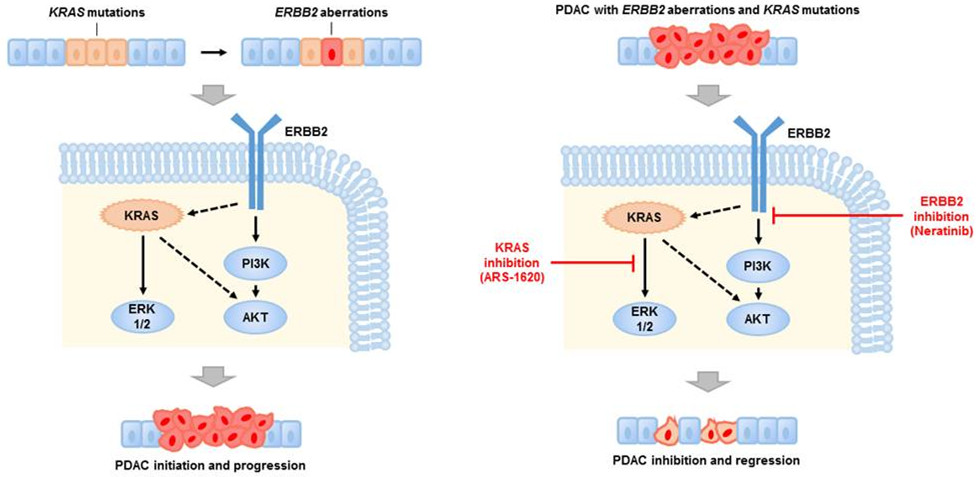
Recently, scientists at Shanghai Institute of Nutrition and Health (SINH) of Chinese Academy of Sciences revealed recurrent genomic ERBB2 alterations in PDAC are oncogenic, and the alterations cooperate with KRAS mutants to promote PDAC progression. This discovery provides new therapeutic target for treating PDAC, and was published online ahead of print in the journal Carcinogenesis on May 2.
Pancreatic ductal adenocarcinoma (PDAC), which accounts for over 90% of pancreatic cancer, is one of the deadliest human malignancies with an overall five year survival rate of less than 6%. It is usually diagnosed at a late stage which precludes the chance of surgical resection as a cure. Chemotherapy is the most frequently used approach for PDAC treatment with limited effect. Current therapeutic options are0 inadequate.
In more than 90% of PDAC cases, the key oncogenic driver is an activating KRAS mutation. It occurs as an early genetic event driving pancreatic intraepithelial neoplasia (PanIN; the precursor ductal lesions of PDAC) formation. Additional genetic alterations are required to contribute to the pathogenesis of PDAC.
In this study, Prof. WANG Yuexiang's group at SINH reanalyzed the Cancer Genome Atlas (TCGA) PDAC sequencing dataset and other genomic datasets. They identified recurrent genomic ERBB2 alterations in PDAC.
These ERBB2 aberrations are demonstrated to be oncogenic, cooperating with KRAS mutants to promote PDAC tumorigenesis. These oncogenic mechanisms can be overcome using ERBB2 inhibitor in combination with KRAS-inhibitory therapy to suppress tumor growth and progression.
The intriguing discovery of this ERBB2 oncogenic mechanisms in human PDAC has immediate biologic and therapeutic implications for clinical practice, which not only identifies an oncogenic role for ERBB2 aberrations in PDAC tumorigenesis, but also provides a rationale for testing an anti-ERBB2 drug in combination with a KRAS inhibitor in ERBB2-mutant PDAC patients that are currently untreatable.
The research was supported by Prof. SHAO Chenghao at Changzheng Hospital, Prof. LU Yuan at Fudan University and Dr. ZHU li at PLA General Hospital. This study was financially supported by National Natural Science Foundation of China, Ministry of Science and Technology of China, Science and Technology Commission of Shanghai Municipality, and Chinese Academy of Sciences.

Left: Oncogenic ERBB2 aberrations promote KRAS-induced PDAC progression; right: ERBB2 and KRAS inhibition cooperates to promote PDAC regression. (Image by Prof. WANG's group)

86-10-68597521 (day)
86-10-68597289 (night)

52 Sanlihe Rd., Xicheng District,
Beijing, China (100864)

